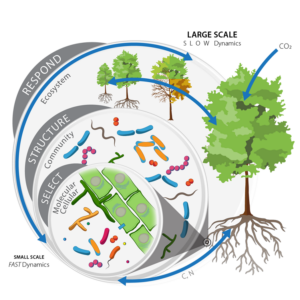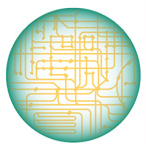Science Focus Area: Oak Ridge National Laboratory
- Principal Investigator and Laboratory Research Manager: Mitchel J. Doktycz1
- Technical Co-Managers: Dale A. Pelletier1 and Timothy J. Tschaplinski1
- Co-Investigators: Paul E. Abraham1, Alyssa Carrell1, Jay Chen1, Melissa A. Cregger1, Omar N. Demerdash1, Ilenne Del Valle Kessra1, E. Peter Greenberg2, Caroline S. Harwood2, Robert L. Hettich1, Daniel A. Jacobson1, Udaya C. Kalluri1, John Lagergren1, Stan L. Martin1, Jennifer Morrell-Falvey1, Wellington Muchero1, Erica T. Prates1, Mircea Podar1, Priya Ranjan1, Scott T. Retterer1, Tomás A. Rush1, Brian C. Sanders1, Christopher W. Schadt1, Amy L. Schaefer2, Claire Veneault-Fourrey3, Rytas Vilgalys4, David J. Weston1, Xiaohan Yang1, Larry M. York1
- Participating Institutions: 1Oak Ridge National Laboratory; 2University of Washington, 3INRAE (National Research Institute for Agriculture, Food, and Environment), 4Duke University
- Project Website: pmiweb.ornl.gov
- KBase Collaboration: Exploration of synthetic microbial communities
Summary

Plant-Microbe Interfaces. The Populus-microbiome interface encompasses diverse biological components and physical and temporal scales that result in dynamic functional processes. Events at the molecular and cellular levels lead to specific, mutualistic host-microbe selection and impact host performance and community formation. Furthermore, the structure of the microbial community depends on specific and nonspecific relationships that vary based on the physical location and dynamic chemical environment defined by the host. These molecular- and cellular-level events can vary over the lifetime of the host and respond to changes in the environment. [Courtesy Oak Ridge National Laboratory]
